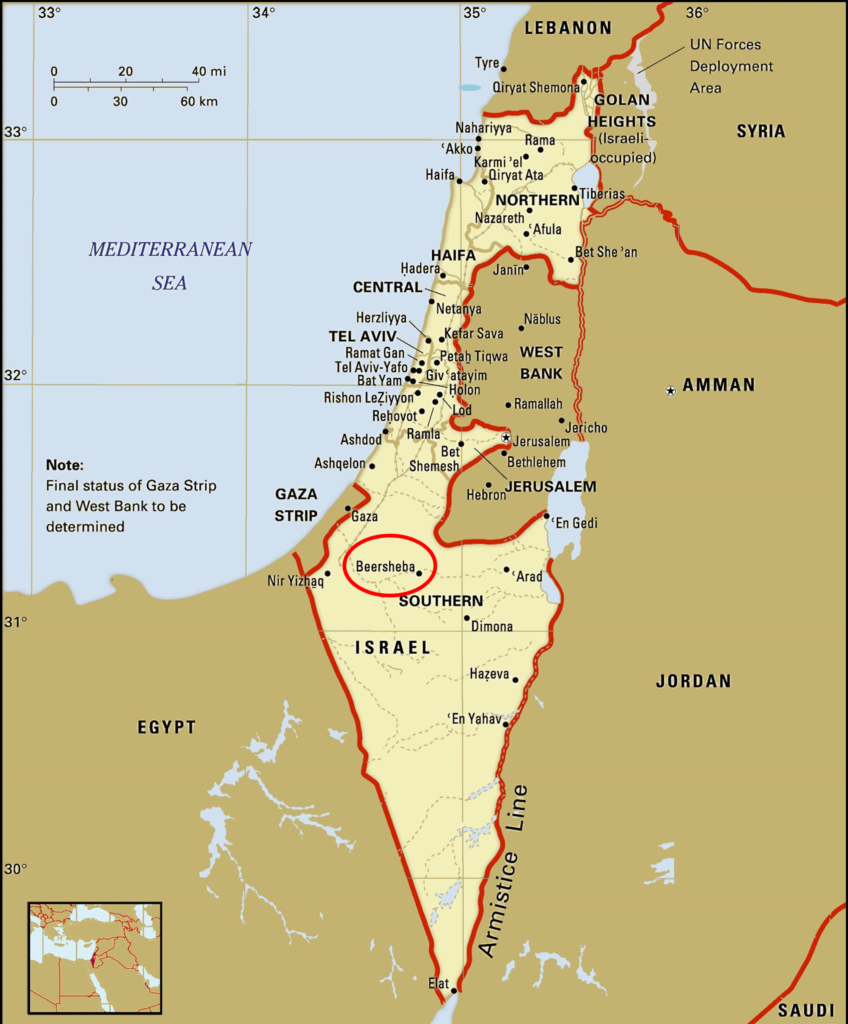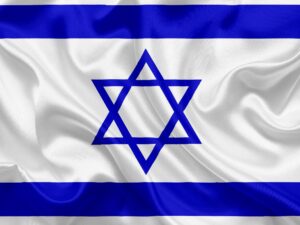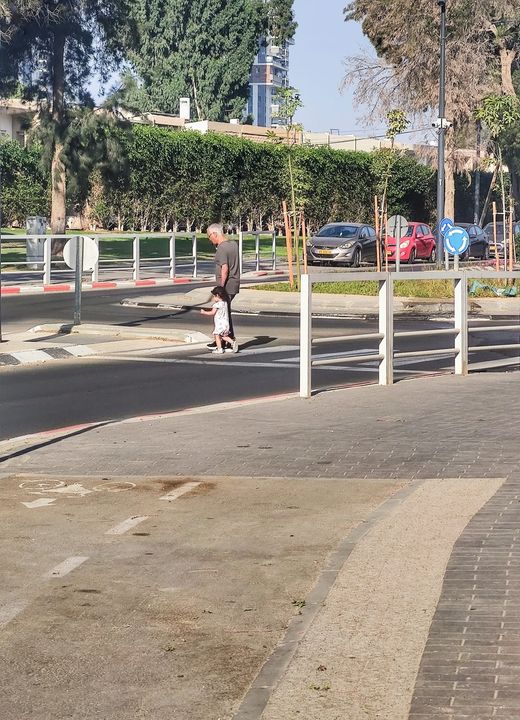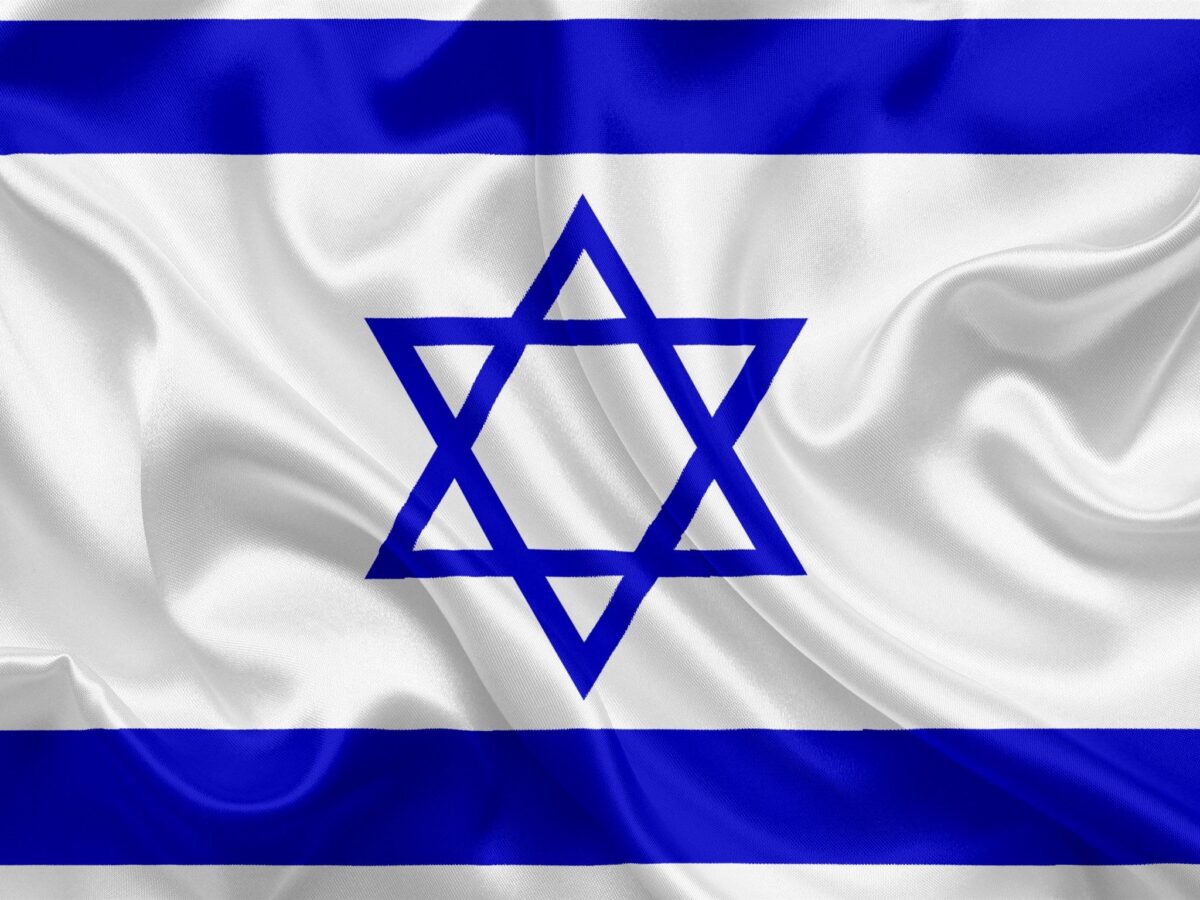
With his permission, I am posting here a series of letters from Aaron Leeper, my first cousin, dated Oct 7 – Oct 19, 2023. These letters are adapted from Aaron’s posts to his Facebook account.
Aaron and his family live in Beer Sheva, in south central Israel (circled in red on the map). He and his wife are American-born. They made aliyah (literally ‘went up’) to Israel in 1978. They have a son, a daughter, and grandchildren who live in the same area.
While Aaron originally wrote these posts for his extended family and friends, they provide a personal ground-level perspective on the Israel-Hamas war that is hard to obtain from the usual US media. And he writes from a cultural perspective that is both Israeli and American.
October 7
We are at WAR!
My wife and I are personally safe (at least as of this writing) in our home’s security room, while air raid sirens wail and concussions split the air. Not everyone can say the same. Prayers for Israel are welcome, and more timely now than ever!
[later on October 7]
To all of you who are praying for us in particular and for Israel collectively, and who have asked for an update from my perspective, we thank you for your prayers and concerns. As I’m sure you know, we live down range from Gaza, in Beer Sheva. We were targeted early in this war. Four solid non-stop hours of heavy rocket bombardment and sirens and booms. Since then it’s been quiet here while Hamas aims their rockets and sends their death squads in other directions, terrorizing other towns and cities. They may aim at us again so we are holding our breath with tense anticipation.
We have a security room within our apartment to simply walk into whenever a siren goes off. We are not too concerned for our safety but we can’t be complacent either. We watch the news as you must also be doing and we see traumatic things happening all over the place, places we know like the backs of our hands. We have no reason to leave our apartment, so as long as our building doesn’t take a direct hit we feel we’ll be fine. Our kids and grandkids are similarly safe and we are grateful to know that. That pretty much sums up our situation here for now.
We are truly touched by your concerns for our safety and prayers for our country. There are no guarantees in life, so we do our best to beat the odds and help others do the same. Our calmness in this storm serves that purpose in the smallest of ways for those who are not so calm. Seeing it on TV as you do and living through it as we do are not at all the same, so I hope you have been reassured by this letter that we are OK.
October 12
“Words from Israel”
Where can I begin to explain our situation in Israel now.
Our airwaves and news services are full of heart-wrenching accounts of lost and missing friends and family members, recounting the last moments anyone saw them alive or the last time their voices were heard begging on their cellphones to be rescued before they were silenced and dragged into captivity. Stories of heroic sacrifices of people who died shielding those who lived to recount the last moments of their heroic saviors. Stories of people who faced certain death but miraculously death passed them by without taking them with it. Stories of those whose brave acts rescued the lives of many others. And stories of mass slaughter that wiped out entire communities and destroyed what remained so the survivors of those “pogroms” would have nothing to return to.
As a society we have been going through all the stages of grief from shock to rage to helplessness to seeking comfort in the stories of others we meet who also knew a victim who is dead or missing or maimed or hospitalized. A certain resignation accompanies these conversations. Nothing can be done to bring the dead back, and if the captives are returned to us they will not be the same and if the injured are healed their scars will never disappear. We know this but we cannot accept it.
There is an overwhelming demand of the hospitals to quickly collect and freeze the sperm of the men who succumb to their injuries so that their wives can hope to still create new life from it and thus perpetuate the lives of their expired husbands.
Rockets are still aimed at Israel’s cities, keeping everyone in them on constant edge. Where I live, in Beer Sheva, only a few rockets have been sent our way, but when they are we know we are still on Hamas’s radar.
Road traffic and commerce in Beer Sheva is light. Most people are spending their time in the safety of or near their homes. I went out yesterday to buy a few groceries and return home with them as quickly as possible. I bought some important staples from whatever was still left on the shelves after panicked buyers had emptied the shelves of many of the things I had gone there to buy but couldn’t find. I also bought a lot more comfort food than I should have, but times like these call for little comforts wherever they can be found.
Today I topped up my car’s tank and tires, “just in case”. And the whole time I was there waiting my turn at the air pump and the gas pump I mentally scanned my surroundings for a logical place to quickly reach and hide were a siren to go off at the least convenient moment.
Nobody is out walking. The only exception is dog owners who must walk their dogs periodically. There was no line of people at the falafel stand where I bought a shawarma-in-pita sandwich to add some pleasing variety to the otherwise narrow range of foods we have been eating at home. We won’t starve but we may become bored with our limited cuisine choices.
So many Israeli have dramatic stories to relate but I have nothing particularly dramatic to mention here, relative to what my compatriots have to tell. It’s mostly mundane things I can think of mentioning in their place. Our apartment is a safe place to pass the time and our children and grandchildren live in safe places, too. I understand that our grandchildren have cabin fever. Their schools are closed during the interim of this war, so they have to be creative to keep busy.
My son-in-law (their dad) is now in uniform and away from home. Three hundred thousand other dads and sons and husbands and brothers (not to mention the equivalent womenfolk as well) are also away from home in uniform. At least my son-in-law has a non-combat role to play, while others are fearful and yet proud of the roles their men (and women) will have to play in our country’s war effort.
We don’t know how long this will go on and what price we’ll have to pay while we wage war, but we have been warned that it could be protracted and perhaps costly in terms of the lives of our soldiers that may be lost.
We are more than grateful for all the prayers and support we are receiving from all over the world, but especially from you. For all of these prayers and this support I want to say: Thank You.
October 13
Our Situation in Israel
Shabbat begins a couple of hours from now, at sunset. We’ve had seven days to digest what has happened and what it means to us. On the TV we are introduced to one person after another who has a personal story to tell. The type of stories they tell bring tears to our eyes or cause us to clench our fists in resolve, or both reactions simultaneously. We are also introduced to men in uniform with all their kit, explaining how focused they are on the purpose they are about to serve in combat for our country.
Women are soldiers in uniform too, ready to serve in their supporting roles behind the lines that make our front line fighters that much more effective. The men describe their touching last moments at home, saying goodbye to their wives and children, hugs all around. I can’t help but look at their faces and know that some of them will never see their loved ones again. They are Israel’s indisputable finest weapons, personified. We’d have no defenders without them.
One touching story we heard on the TV was told to us by one of the TV field reporters as he stood beside a road block set up to keep people from entering the military zone. While the reporter was there he witnessed a car pull up to the road block. The soldier manning that road block told him he had his orders to turn anyone who approached back in the direction they had come from. The driver got out of his car and began waving his arms and shouting at the soldier, his voice ranging higher and higher with emotion. Then the driver broke and began sobbing. At this point the soldier and the driver hugged each other for a few poignant moments.
It seems that the driver lived in one of the kibbutzim that had been decimated by the terrorists that had attacked it. The driver only wanted to go and collect his dog and drive away with it. After a few moments the soldier, who had checked with his superiors, returned to the driver with the news that he would be permitted to go collect his dog. Both the soldier and the driver are dog owners, it seems, and the soldier understood how important this gesture would be.
The field reporter continued to speak to us, his audience, who by now no doubt were moved to tears ourselves, that among the forces scanning the destroyed and evacuated kibbutzim for those who had been killed was a special unit of soldiers who were rounding up all the family pets they could find. Some would be reunited with their owners if they had survived, and if their owners were no long among the living, these pets would be re-homed with new owners.
In this soon-to-be war zone, in the places where death and destruction had reigned, the lives of their pets are valued enough to assign soldiers to search for them and bring them out.
I will finish by wishing one and all Shabbat Shalom (Peaceful Sabbath) and pray that it is at least so for all of you, wherever you are as you read this.
October 15
“Past, Present, Future”
Here I am, caught in the present, held captive between past events and future events yet to come.
I sat in front of my computer this morning looking for news items that would enlighten me about what transpired last Saturday, beginning with the first moments the terrorists crossed into Israel in a hoard of thousands (various reports written at different times and reported by different sources placed the number of infiltrators as being from at least 1000 to as many as 2000, or perhaps even more).
With detailed instructions and detailed maps of their targeted destinations in their pockets they came from the sea and from the sky and across the land at lightning speed, on motor cycles and pick-up trucks, fully armed with weapons of all kinds. Some were wearing military style uniforms, some even wore protective vests. They even came with cameras to document their exploits for the folks back home. They were equipped far better than the first responding forces who rushed up to confronted them.
This was not the usual band of several terrorists attacking a single venue that could ordinarily be dealt with by such a dedicated force, but rather a disciplined army massively attacking multiple locations simultaneously. Many outgunned policemen and soldiers were killed during their initial encounters with these well-armed terrorists and their effectiveness was quickly degraded, to the point where they could only regroup and concentrate on defending key locations and leave the rest to fend for themselves as best they could, which they did, valiantly, heroically, but alas, all too many did so in vain.
Never before had there been so large and so complex an infiltration of terrorists, not ever. Hours went by while a larger answering force was brought up, during which time the invaders had the run of the places they invaded, enough time to go door to door unhindered, to casually and systematically kill or capture whomever they pleased. Enough time to methodically hunt down and kill or capture the scattered party goers who had no place to hide. It took all that day and into the next to gather an overwhelming military force to confront and vanquish these invaders.
That was last Saturday. That was “the Past.”
Now, this Saturday, we have over 300,000 soldiers in uniform poised to overrun the Gaza Strip in an overwhelming way, such that as I write this, more than one million Gazans are being warned by us to flee for their lives or be caught in the crossfire. Some have managed to flee before this ultimatum comes down, some have been hindered from doing so by Hamas at roadblocks set up along designated safe-escape routes, and some simply refuse to flee because they’ve been told by Hamas that we are bluffing. But if we are not bluffing, these people serving Hamas’s purposes as human shields may get the worst of it for having made the wrong choice.
This is “the Present.”
No one can see into the future, they can only pull back the curtain a crack and squint into the future and try to make out what they imagine they see and interpret it as they wish it to be.
“The Future?”
As for the future I’ve been asked what I think should happen next. Am I sympathetic for the plight of the one million non-Hamas Gazan civilians? Do I think we should go full bore and destroy Hamas no matter how much of Gaza we destroy in the process? Should we pause and negotiate for the release of the hostages or have them be our second priority after crushing Hamas as our first priority? Should we allow humanitarian aid into Gaza to prevent a humanitarian crisis or should we maintain our hermetic siege and just lay the blame on Hamas for callously disregarding the welfare of their own citizenry?
I also ask myself these same questions about the right course the future should take, but I don’t have the power to answer them. I can’t set policy, or make life or death decisions that will steer the future toward a fitting outcome. Powers greater than I will be the ones who’ll be deciding what these answers will be. I can only hope they answer these questions correctly.
But what I do know is what happened last Saturday and I do know that those 1,300 Israelis who were slaughtered in cold blood cannot be allowed to have died in vain, without an answer for them.
October 18
“A snapshot of life in Israel”
Yesterday I travelled to Holon, a suburb of Tel Aviv on its southern side. It was my first time out of my neighborhood, much less out my city. I had a follow-up medical appointment to keep at Wolfson Hospital.
We have a country-wide warning system called “Red Alert” that warns Israelis to immediately take shelter when rocket launches are detected. From data instantaneously calculated from their trajectories it can very accurately be projected where the rockets will fall (if not intercepted by our iron dome defenses, of course). There are several hundred towns and villages they can reach, so in most of them sirens will wail to warn their residents to hide when they are targeted. In large built-up cities the warnings are more localized so that the whole city doesn’t have to drop everything and scurry to safety; only people in the relevant quadrant(s) need to do so.
Beer Sheva, for example, has four quadrants; Razelle and I live in the western quadrant while Shalev and Lee live in the northern quadrant. We can see whether or not the warning alerted them and they can see if it alerted us. After the booms and a cautious pause we check on each other. And Maayan can see if either of us was bombed from the safety of her remote mountaintop village, far out of range from all but the rarest long-range rockets.
So, because I would be traveling on a highway through open areas with no villages and therefore no sirens, I programmed my Red Alert app on my phone to warn me all along my route. I made it all the way to Holon an hour and a quarter away without incident. Traffic was not negligible, but not heavy either.
At Holon I parked in a large parking lot that I was surprised to see was quite full. From the parking lot I walked under a very busy road through a pedestrian tunnel and into the hospital. I was still apprehensive about what might occur, and if so, when. I couldn’t shake the dread I’d been conditioned to live with in Beer Sheva for more than a week by now. During the drive I tuned my radio to a news channel which also announced where warnings were sounding, so I was doubly prepared to stop the car, get out, and high tail it to a roadside ditch. I even watched how the other drivers around me were behaving so I would have a clue when I should do the same.
As I said, no such thing happened all the way to Holon. What struck me about the people I saw in Holon, in and out of the hospital, was their relaxed demeanor, as if the war were far away and no threat to them here. The hospital had a healthy number of Home Front Command soldiers milling around in their distinctive dayglow orange vests, but otherwise Wolfson hospital didn’t look any different than it had the last time I was there in July.
Listening to the interviews on the radio, I noticed a change in the way the interviewees spoke now, ten days after the Sukkot Massacre. During the days immediately following the massacre there was a lot of anger, wailing and crying. Why did this happen? Who failed them? There were endless stories of heroics, close calls, blood and tears, hair pulling grief, pain and death. During the drive yesterday, though, I heard different tones: those of pride, those of mournful soul-searching, and those of stubborn determination; recollections of fateful moments, of lost friends and family, loss of property, loss of way of life, but the shrill wailing and anger was no longer there. One interviewee spoke happily of his dead relative in terms of his having fulfilled his God-given assignment in this life and having been elevated to heaven to receive a pat on the back and a handshake and congratulations for a job well done while he had been among us.
Another interviewee, in a quiet slow deliberate voice gave a minute-by-minute account of what transpired during the hours they tried to survive the onslaught on their kibbutz, family by family, child by child, parent by parent, grandparent by grandparent and neighbor by neighbor. He related their exchanges of frightened, frantic phone messages in real time, and when their phone messages ceased it indicated that they’d finally been killed or captured, and that was that. His delivery was slow, deliberate and devoid of emotion. When he was asked if he would return to his village to rebuild it and live there again, he answered after a long pause that after the years he’d lived there among so many people who died desperately trying to avoid death and losing, being shot, butchered, burned or hauled away into captivity, the trauma of it all made him uncertain how to answer. He said he knew that he would eventually be asked that question during the interview but he had no answer to give. The moderator prodded him for an answer anyway by asking if he still considered that village to be his home, he answered softly, and for the first time during the interview with discernable emotion, “Yes it IS my home, it IS my home.”
Others spoke of the destruction of their villages, down to the very foundations, their livestock shot and their possessions looted. They defiantly declared that they would not be pushed off their land. Their village would rise out of the ashes and rubble and be built again, better than before, with new pioneers joining the remnants of the pioneers who had survived. But the man who spent the better part of an hour holding our attention, who admitted that yes, it IS, not was, but IS his home, couldn’t bring himself to say if he’d return. And we listeners understood all of these people and related to their feelings of hollowness and of stubbornness at both ends of the spectrum of human emotions.
While I was at the hospital I was able to buy some items at the mall next door to donate to our soldiers stationed on the front lines. Finding a store where I could buy these things was propitious, because back in Beer Sheva such stores are not open. Then I drove back home.
Traffic on the highway was crawling a good part of the way. The obstruction to steady flow was all the heavy military vehicles being transported in the same southerly direction I was going. Tanks, troop carriers, a massive bulldozer, a huge shipping container painted khaki green, all these were piggybacking on flatbed trailers that were slightly wider than one lane, so passing them required patience. That slow, wide-load traffic was testimony to the land-based warfare that is being prepare for, leaving us in suspenseful anticipation as to when that might materialize.
Once home I took a nap. It had been a long day. That evening I checked my Red Alert notices and saw that while I had not been glued to the non-stop TV broadcasts and updates, Holon had been targeted by long-range rockets. I could picture all those complacent people I’d been among earlier in the day, now scurrying toward their shelters. According to the notices, they were targeted once an hour for the next four hours before that pattern broke off, as if the launches were on an unmanned timer. I was thankful for the hours of tranquility I had experienced all the while I was there, because such tranquility is definitely not a given.
This morning I bought a few more items from a hardware store in Beer Sheva that I found was open, then I took all my purchases to the collecting point for donations to soldiers and to displaced families. An elderly woman showed up with a new blanket she had just purchased under each arm to donate to the families. She said she would have brought more but this was all she was able to carry.
The guy who manned the collecting point chatted with me a bit and pointed out something I myself had not noticed. No Bedouin were to be seen in the streets as they ordinarily would be, and even the Bedouin pharmacists at the pharmacy in the mall had not come to work. He thought that maybe they feared some kind of harassment after the massacre and were staying out of sight. I don’t have an explanation or confirmation either for this, but that’s what he thought.
Also interesting was the conversation I had with the proprietor of the hardware store. I told him that what I was buying was for the soldiers and he got angry. His anger is leveled at the soldiers who failed to appear while the terrorists had free reign to methodically massacre and capture whomever they pleased.
This is a snapshot of sorts of what life is like in Israel, as seen through my eyes, and of the people I’ve met during the past two days.
Everyone, but everyone, has their own story and some want to tell it to whomever will listen; others have withdrawn into themselves and reveal nothing of what they feel, but their body language does the talking for them, and there are others who rage with anger who don’t know where to aim it.
And lastly, there are those who carry on living as they had before because doing otherwise changes nothing that has already happened.
October 19
I dared to leave my flat for the first time early in the morning on the fifth day of the war to buy a few needed groceries. The streets were eerily empty of cars when they would ordinarily be full of rush hour traffic. I encountered a neighbor who I know has a dog but he was out walking his granddaughter instead. I joked with him about that. We asked each other how we were doing during these days of tension and grief, then we went our separate ways. I’m presenting this photo to show in a subtle but powerful way how war is affecting us.



3 replies on “Letters from Israel October, 2023”
Personal postscript – Aaron’s writing has appeared before on this site — see https://bit.ly/3Q6mlLl for his commentary on Israel’s successful protection of their schools from terrorists. https://bit.ly/3Q6mlLl
thank you for sharing, our cousin is very humble. I don’t go on fb (im on X) however I succumb during times like this. The following day, Oct 8, my sister and I were talking about how long it would be until the world no longer empathizes with the people of Isreal, and the Jews around the globe. We feared it would be weeks and were horrified it was days. I have tried to express to my sister and family members the path our country is on, and they turn a blind eye. this saddens me. we should not be to this point, it was ingrained in me NEVER TO FORGET, and I feel many of my loved ones had forgotten.
be well my cousin stay safe, stay free,
(anna mae’s daughter) beth
I have no words!
My family escaped Nazi Germany, my Father was in the camps, I can still hear my Grandfather crying, screaming in his sleep down the hall!
I was lucky to be born in America, my Dad died when I was 3 from a disease he caught in the camps, I think!
My family never spoke of whatever they went thru, never, but my Sister, quite the writer, wrote a few notes that I have read, still read of the Nazi’s marching into Austria, their home! She lived her whole life, past in her late 80’s, never even tol her husband of her fears and anxieties until maybe 10 years before she passed! She was never as frightened as when the Nazi’s took my Mother off the train they were on to question and stripped, her, never more afraid. She lived with ALL her fears until her death, about 10 years ago!
They all (family)made a life, mostly good here in America, Thank God!
I was born quite poor, but a good family, rough area of the Bronx, but I learned to take care of myself, be independent, and always worked and enjoyed it, I had no choice, but I have no regrets.
We all did what we had too, we had to fend for ourselves, which is a damn good way to start your life, I had dreams, I also had and have a good family, friends and an Amazing Life!
This story, whom David Leeper I know, respect and consider him a wise valued friend I take to heart, and I will continue what I do daily, I look at my family pictures, in Europe, in America and that is where I get my strength from, and like the Israel’s, I will do whatever has to be done to protect family and country, regardless!
🇮🇱💪🥊🙏🙏🙏🙏🇺🇸🙏💪💪💪